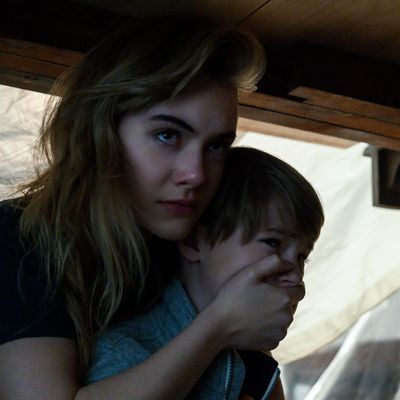
After a couple of failed attempts at Fox and Hulu, Joe Hill and Gabriel Rodriguez’s Locke & Key has finally made its way to the small screen, courtesy of Carlton Cuse (Lost, Bates Motel), Meredith Averill (The Haunting of Hill House), and Aron Eli Coleite (Heroes). Fans of the dark graphic novels are likely going to be startled by the overall tone of this series, one that has more in common with young-adult fiction than H.P. Lovecraft. Netflix and the team have clearly approached this material in an effort to find the next Stranger Things, or maybe a lighter version of The Haunting of Hill House, rather than to deliver on the vicious promise of the source material. We’ll never know what could have been if Hill’s vision had been more faithfully adapted, but there’s still a lot to like here, including a talented young cast, a strong visual sense, and a lot of the book’s themes about family and loss were retained. You just have to get over the shock of the tonal softening.
After a creepy prologue involving a man bursting into flames after shoving a key in his chest, “Welcome to Matheson” dives right into the narrative, much of which is only slightly different from the source in terms of plot. As in the book, the Locke family is dealing with trauma after Rendell Locke (Bill Heck) was viciously murdered. On the show, Rendell is confronted in his home by Sam Lesser (Thomas Mitchell Barnet), who demands to be told “what I need to know about Key House!” Before Rendell can even say much, Sam shoots Rendell, seemingly almost by accident, when Rendell’s son Tyler (Connor Jessup) pounds on the front door. More about that day will surely be revealed, but for now, Rendell is dead, and his widow and three children are moving back to the creepy Locke family home, a place with hidden doors and long hallways that hold years of secrets.
Tyler is the oldest, a popular kid who’s deeply traumatized by watching his father get murdered. His sister, Kinsey (Emilia Jones), and mother, Nina (Darby Stanchfield), aren’t doing much better, but young Bode (Jackson Robert Scott) seems almost excited about the change in scenery and the chance at a fresh start. He explores the grounds of the new family home, stumbling upon a well with a very dark resident. Someone or something is living in that well, talking only to Bode, telling him about how this house is full of keys, objects with magical powers. It starts with a photo magically appearing on top of the well after falling into it and then the wonderful exchange in which Bode asks, “Are you my echo?” “Yes, I am, Bode,” the voice at the bottom of the well replies.
While Bode is making a new friend in an abandoned well, his brother and sister are getting to know people at their new school. Tyler seems to be pretty popular right off the bat, making friends on the hockey team and even hooking up with a girl at a party, only to be shocked by a vision of Sam, the boy who murdered Tyler’s father. Kinsey has an early potential love interest, too, with Scot (Petrice Jones), the nice kid who works at the ice-cream parlor and leads something called the Savini Squad, named after legendary makeup expert Tom Savini. Pro tip: Don’t show the traumatized girl you’re interested in Day of the Dead the first time you hang out. It won’t go well.
The Tyler and Kinsey school material feels the most distinctly removed from the source in the premiere. While there’s some of that in the books, especially later, it almost feels like a pilot for Locke & Key should focus solely on the house and the evil force living in its well. To be fair, most of the narrative thrust this episode does center on Bode, his new friend, and the two keys he finds. The school material is just designed to deepen Bode’s siblings in terms of character, and maybe draw some of the crowd looking for a teen show with a twist.
The first key Bode procures is the legendary Anywhere Key, which can turn any door into a portal to anywhere in the world. Bode uses it to get himself an ice-cream cone, but it doesn’t work when Kinsey tries to teleport to the Eiffel Tower. At the end of the episode, the “Echo” tricks Bode into giving her the Anywhere Key, which she then takes to Sam, the man who destroyed the Locke family. A key that can turn any door into an escape could come in handy for someone behind bars.
Before then, Bode also finds a key that opens a “door to the prison of yourself.” It actually turns his reflection in a mirror independent, and the alterna-Bode then beckons the kid to join him. He refuses, but mom jumps right in, getting stuck in a hall of mirrors. Tyler has to tie a rope around his waist and rescue her from this reflective purgatory like Carol Anne being pulled out of the in-between in Poltergeist. It’s a sign the Locke family is going to need one another to survive what’s coming, and that even something as seemingly trustworthy as their own reflections could betray them.
Unlocked Doors
• When Tyler comes to Key House and calls it “a little more Norman Bates,” it’s obviously a Psycho reference that had to make Cuse laugh a little after coming off Bates Motel. He just finished a show that was a LOT more Norman Bates.
• The town name here, Matheson, has been changed from the book, which is set in Lovecraft, Massachusetts, an obvious nod to one of Hill’s biggest inspiration points for the comic; apparently the name change came at Hill’s request, as a way of honoring another revered horror/fantasy author, Richard Matheson, who wrote I Am Legend and What Dreams May Come.
• The main thing that’s making the YA approach more palatable to me beyond Cuse’s involvement is the casting of the young ensemble. Jessup showed incredible range on American Crime, and Jones, and even Scott, make instant impressions. If Locke & Key was going to skew younger, it would be essential to cast the kid roles well, and it appears to have done that. Also, Bill Heck! More on how much he rules later.
• Michael Morris directed the pilot, giving it a nice rhythm, which he’s done before on Bloodline, House of Cards, Halt and Catch Fire, Billions, and Better Call Saul, among others. He’s relatively young compared to a lot of TV directors, but clearly amassing an impressive résumé.
• The series premiere is loaded with pop-culture references from A Clockwork Orange to Psycho to George Romero to Harry Potter. I’m not sure this is the best approach. Locke & Key worked from more literary inspirations than film or TV, drawing heavily from Lovecraft and gothic horror, but it feels a little cheap to so blatantly shout out great films. It’s almost Stranger Things–esque, although all the open nods to other properties are more intrinsically part of the brand there. It seems more awkward, verging on desperate, here.
• Don’t worry, I won’t comment on book-to-screen differences every recap. Clearly, the Netflix version of this is going to be very different from the source material. Now that we know that, let’s see if it can become its own confident thing, much like Bates Motel ultimately stepped out of the shadow of Alfred Hitchcock.


